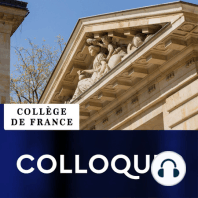Écoute de 2 min

Colloque - Archives paléo-babyloniennes : 140 ans de publications et d'études (1882-2022) : From the Tablets to the Lemma: Old Babylonian Archives as…
Colloque - Archives paléo-babyloniennes : 140 ans de publications et d'études (1882-2022) : From the Tablets to the Lemma: Old Babylonian Archives as…
évaluations:
Longueur:
24 minutes
Sortie:
25 mai 2023
Format:
Épisode de podcast
Description
Civilisation mésopotamienneDominique CharpinCollège de FranceAnnée 2022-2023Colloque - Archives paléo-babyloniennes : 140 ans de publications et d'études (1882-2022) : From the Tablets to the Lemma: Old Babylonian Archives as a Source for a Corpus-Based Dictionary of AkkadianIntervenant(s)Hervé Reculeau, University of Chicago, ChicagoJust a little under forty years after the first Old Babylonian archival documents were published, the project of a comprehensive dictionary of Akkadian was initiated by James Henri Breasted in Chicago. Over the course of ninety years (1921-2011), the Chicago Assyrian Dictionary (CAD) brought together Assyriologists from many countries and specializations, aiming at a comprehensive lexicographic description of Akkadian through its various dialects, stages, and to some limited extent corpora. A century after this pivotal moment, Akkadian lexicography is entering a new era, that of the Digital Humanities revolution and the associated flourishing of online databases of cuneiform texts in Akkadian, accessible via a variety of projects, sites, and formats (ArchiBab, ORACC, OARE, EBL, etc.). With the sustained expansion of the number of available cuneiform texts (fully published or not) and the necessary increasing specialization within Assyriology, no single scholar, or even group of scholars, can pretend to offer an overview of the entire Akkadian language anymore. The prospects of a renewed comprehensive dictionary of Akkadian can therefore only be addressed from the bottom up, through corpus-driven lexicography and the establishment of specialized dictionaries that, brought together, will offer a presentation of Akkadian as one language with many facets. The proper identification of corpora will be key to the success of such an enterprise, and the traditional subdivisions of Akkadian into chrono-geo-typological "dialects" need to be refined and partially replaced by approaches that account for the variety of linguistic contexts existing within each of these "sub-phases" as well as the lexical continuities and discontinuities across them. Old Babylonian archives present a unique variety of textual genres, archival contexts, and linguistic expressions, and not only is a good portion the corpus now accessible via ArchiBab, but its lemmatization possibilities also allow for the easy identification of terms across archives, which forms the basis of a potential dictionary of the language found in Old Babylonian archival documents (as partially distinct from contemporary linguistic expressions found in other types of cuneiform texts)—a project currently addressed by the Franco-Russian project "Laying the Groundwork for a Corpus-Based Dictionary – The Old Babylonian Akkadian Dialect". Within this "dialect" it is even possible to identify specialized lexicons, sometimes exclusive to certain regions of Mesopotamia and reflecting local conditions, as will be shown through terms associated with irrigation technology and landscapes.
Sortie:
25 mai 2023
Format:
Épisode de podcast
Titres dans cette série (100)
10 - Les sociétés africaines et le monde : une histoire connectée (1900-1980) - Conclusion de Colloques du Collège de France - Collège de France